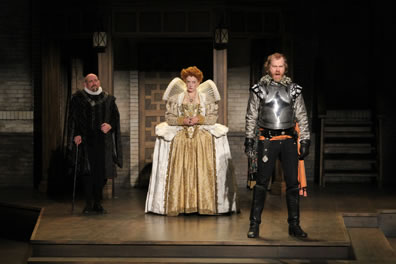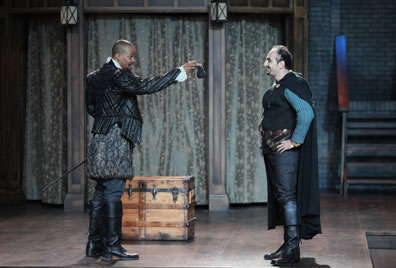Shakespeare's Rebel
A Play about Shakespeare, Elizabeth, Essex, Cecil, Burbage, Tess, Ned, Sarah and…
By C.C. Humphreys
Bard on the Beach, Howard Family Stage, Vancouver, British Columbia
Saturday, August 15, 2015, Section 2, B–36 & 37 (center of center seating in deep thrust theater)
Directed by Christopher Gaze

Robert Devereaux, Earl of Essex (John Murphy, right), publicly accepts the governorship of Ireland from Queen Elizabeth (Colleen Wheeler) as Sir Robert Cecil (Robert Klein) watches in the Bard on the Beach production of C.C. Humphrey's Shakespeare's Rebel. Photo by David Blue, Bard on the Beach.
John Lawley, swordsman extraordinaire, is William Shakespeare's closest friend. He is an actor and fight choreographer in the Lord Chamberlain's Men, Shakespeare's acting company. He also happens to be a confidant of the Earl of Essex. And of Queen Elizabeth, too, who has just knighted him despite his involvement in the Essex rebellion. Now, Lawley is marrying long-time love interest Tess, the owner of an inn, and ready to play alongside their son, Ned (who has just joined the Chamberlain's Men), in Shakespeare's next play at the Globe, Hamlet.
Lawley is certain Shakespeare's latest play—rewriting a previous failure—will be a box office disaster. As he and Tess stroll off into post-play nonexistence he's telling her that Hamlet won't last a week and will be forgotten—unlike Love's Labour's Won, he says: "That one will never be forgotten. I played Lucius."
It's the final winking Shakespeare reference in a whirligig of a play, Shakespeare's Rebel that C.C. Humphreys adapted from his novel of the same title. Humphreys packs not only a lot of iron- and irony-filled action into its nearly three hour's traffic jam on the Bard on the Beach's Howard Family Stage but as much insider Shakesgeekdom as he can muster. That leaves little room for character development, so mostly what we get is superficial souls peopling the play's multiple plots, and despite a generally talented company, only a couple of performers lift their characters beyond caricatures.
The plot(s) centers on Lawley (Benedict Campbell). His resumé includes fighting alongside Robert Devereux, the Earl of Essex (John Murphy), in the capture of Cadiz in 1596, but he also had been an actor long enough that he kidnapped a young William Shakespeare when Lawley's touring company lost two of its actors in Stratford-upon-Avon, which would have been around 1590 (we are told that Anne Hathaway was peeved). At some point, Lawley romanced Tess (Jennifer Lines), who subsequently gave birth to Ned (Chirag Naik), but they never married. Lawley still works as an actor and fight choreographer, but he has fallen into a life of alcoholism, womanizing, and debt.
Things get interesting (for him, at least) on three fronts. One, Tess is about to marry Sir Samuel D'Esparr (David Marr), whom Lawley and others call "Despair." Two, Essex is looking for Lawley to join him on his latest expedition while Queen Elizabeth (Colleen Wheeler) and Sir Robert Cecil (Robert Klein) are trying to recruit Essex to become governor of Ireland. And three, the Queen needs Shakespeare to present a patriotic play and enlists Lawley to convince his best friend to write about Henry V. Lawley finds himself spinning in webs of deceit, including entering a romantic tryst with the spy Sarah (Andrea Rankin)—a spy for whom, the Queen or Cecil, we can't be sure—when all he wants to do is settle down, swear off fighting and alcohol, and help the Chamberlain's Men successfully open its new theater, the Globe.
As so many conspiracy plots and counterplots keep coming at him, Campbell's Lawley keeps responding in the same exasperated way. You might think you are watching a tape loop, hearing the same conversations over and over. This might have been meant to represent the whirligig of life, but you begin feeling like Bruce Springsteen telling "Sandy" how he was stuck on the tilt-a-whirl down on the south beach drag on the "4th of July, Asbury Park"—you think you might never get off. Lawley's exasperation, comical at first, becomes representative of your own after a while.
Humphries would have served the play better by focusing on one or another plot. The Essex Rebellion by itself would make an intriguing play, putting Lawley in the middle of the complicated, romantic and political relationship of Essex and Elizabeth and the opposing patriotic ideologies and machinations of Cecil and Devereux. I contend this should be the play's sole focus because these three characters resound the most in this production. Wheeler's Elizabeth is an astute politician if not a smart woman, as her heart gets the better of her wisdom at times. Balancing these aspects of her personality and ably managing Cecil's ambition, while behaving as down-to-earth as a tavern wench, make Wheeler's queen the most heroic figure in the play. Klein plays Cecil as evil personified, a scarily dark figure in the English court, especially opposed to the blond, bright Essex (both in disposition and as dressed by Costume Designer Christine Reimer). Cecil makes us shudder whenever he appears, yet he is the Queen's one, true protector, and by extension England's unsung hero.
Murphy turns in the production's most complex performance as Devereux. At times, this Essex is a vapid, a spoiled nobleman who still thinks of Elizabeth as his silly girlfriend rather than the powerful (in her own right) Queen of England. At times he is the stalwart patriot, and this trait gets him into trouble of his own making when he misreads the political landscape of the court and country, exacerbated by his utter lack of military acumen (if he'd only listen to Lawley as he did at Cadiz! we hear over and over). At the end, Murphy's Essex cuts a truly honorable figure, laying down his arms and then laying down his life (and losing his head) for love of his queen. Murphy gives such honest depth to his portrayal that we see Essex as heroic and idiotic in the same countenance.
Although this plot makes up the main substance of Shakespeare's Rebel, and the Tess tryst is a mindless (and sparkless) romantic subplot, Humphreys makes sure Shakespeare is never far from our conscious, however superfluous the playwright (a brooding Anousha Alamian) may be to everything else in the play. Humphreys seems intent on checking off as many obscure incidents, legends, and near legends of Shakespeare's life as he can:
- Shakespeare made his way from Stratford to London by joining a touring company of actors—check;
- Shakespeare took a break from writing plays so he can write sonnets—check;
- Shakespeare writes a play at Elizabeth's personal request (via Lawley)—check;
- Shakespeare writes Hamlet in memory of his recently dead son, Hamnet—check;
- The famous clown Will Kempe is an egotistical problem for the company—check.
All of these and many more attempts at being inside-Shakespeare-clever lead to as many historical gaffes as the film Anonymous made (at least Humphreys doesn't question Shakespeare's authorship). Shakespeare writing sonnets as a break from playwriting is writer's fancy, overlooking the notable coincidence that the sonnets seemed to have been written when the theaters were closed for plague. Elizabeth might have commissioned some plays, but Henry V was clearly a sequel to the hugely successful Henry IV plays. I'm particularly intrigued by the person of Will Kempe, a famous clown and talented thespian, considering the parts he played (e.g., Bottom, Falstaff), so my own Shakesgeekdom gets a charge out of watching the Chamberlain's Men's leading actor and shareholder Richard Burbage (Michael Blake) chastising Lawley for punching Kempe during a performance of Much Ado about Nothing. Burbage and Shakespeare are glad the egotistical clown got his comeuppance, but, according to Burbage, Kempe is so popular that the incident didn't go down well with the audience.
My knowing chuckles turned to a "huh?" however, when Lawley describes how he threw the punch because Kempe was pretending to do a speech to his invisible dog in the second act of Much Ado. We know by historical record that Kempe played Dogberry in that play, a character who doesn't appear until Act III, Scene III, and doesn't have a dog (Lance, a Kempe-like character in The Two Gentlemen of Verona, had the dog). Of course, whether Lawley even knew he was in a "second act" is open for debate, too.

Richard Burbage (Michael Blake) holds out a purse to William Shakespeare (Anousha Alamian) for his next play in the Bard on the Beach production of C.C. Humphreys' Shakespeare's Rebel. Shakespeare is a peripheral character in the play, but he gets quoted a lot. Photo by David Blue, Bard on the Beach.
I may seem to be picking nits here, but the point is that the excess of Shakespeare references are a distraction. The script is filled with catchphrases from a variety of Shakespeare plays—for example, "I was not shaped for such sports," "I'll cut his throat in the church," "I know not seeming"—even though these lines have nothing to do with Shakespeare or his works. You can't tell if the characters are speaking Shakespeare-penned lines that have already made their way into the popular lexicon of the time or, given the chronology of Shakespeare's Rebel in which Hamlet opens after the play ends, if the characters are speaking popular lexicon that Shakespeare inserted into his plays. Or is it just Humphreys showing off?
It's a mish-mash of ideas, plots, and insider references that with more pinpoint focus would have made five separate and potentially great plays. Sticking to Shakespeare-focused ideas, the writing of Hamlet would be interesting fun, much as the film Shakespeare in Love is in the writing of Romeo and Juliet and Bill Cain's Equivocation in the writing of Macbeth. The historical role of Shakespeare's Richard II played on the eve of the Essex Rebellion is ripe for a good political thriller. The circumstances around the building and opening of the Globe would be grist for good comedy, as would fleshing out the sparse historical record of Will Kempe's time with and departure from the Chamberlain's Men (though I have seen a one-man show about Kempe). And what about that Love's Labour's Won? Those three words in Francis Meres' 1598 list of Shakespeare's plays have mystified scholars and enflamed theater practitioners' imaginations since, and Lawley's enigmatic exit line in Shakespeare's Rebel could have been the fictional foundation of a play about a non-existent play.
As it is, it's just the last wink in the whirligig, and we can finally get off.
Eric Minton
September 7, 2015
Comment: e-mail editorial@shakespeareances.com
Start a discussion in the Bardroom



 Find additional Shakespeareances
Find additional Shakespeareances